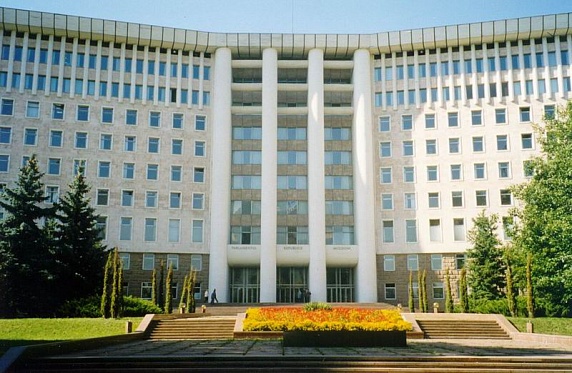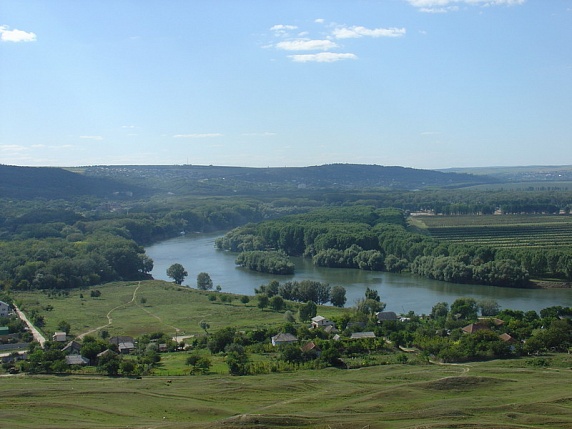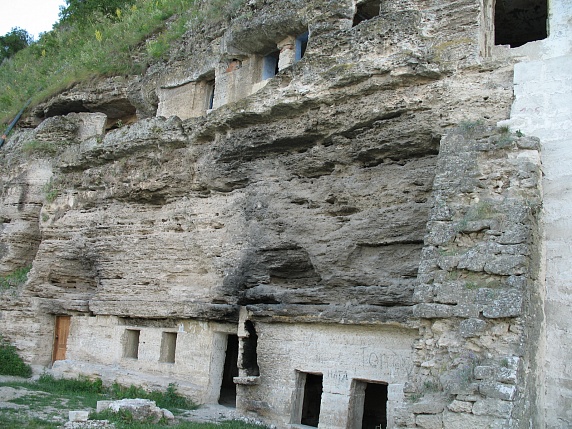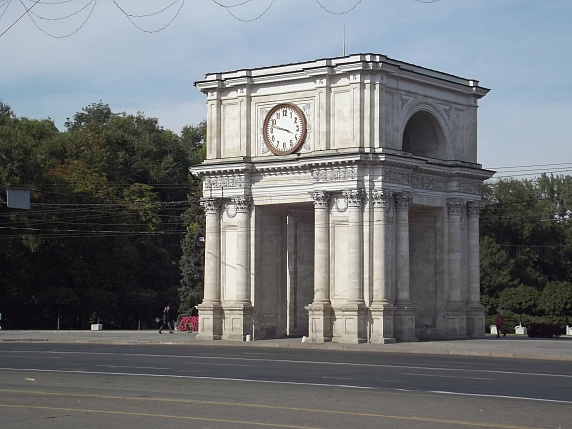 Республика Молдова
Республика Молдова
State Secretary and Deputy Foreign Minister Grigory Karasin’s interview with Kommersant newspaper, October 2, 2017
Question: This is not the first time that Chisinau has demanded that the Russian military contingent be withdrawn from Transnistria. The Russian authorities have provided many reasons why this cannot be done. Is Moscow still against it?
Grigory Karasin: Absolutely. Russia and many other responsible members of the UN are extremely sceptical about this initiative, which they see as a potential source of open tension in southeastern Europe. Are the existing seats of confrontation not enough?
The practical solution to the Transnistria problem is not in advancing “revolutionary” initiatives at the high UN platform, initiatives that clearly cover third party interests and aspirations, but in painstaking efforts of the Permanent Conference on Political Issues in the Framework of the Transnistria Settlement Process (the 5+2 format of mediators and observers). This international mechanism is the venue where a viable solution to the Transnistria problem should be found. I do not understand, however, why the OSCE is taking so long with this.
Question: The peacekeeping operation in Transnistria is a sore spot in relations between Chisinau and Moscow. The Moldovan authorities believe that this operation should be changed into a police mission. Moscow believes that this could provoke an open conflict. Do you think that another hot phase in the conflict is possible in Transnistria?
Grigory Karasin: I want to point out that we are focused on a political settlement in Transnistria. Russia is one of the mediators and guarantors of a settlement based on respect for Moldova’s sovereignty and territorial integrity. Any attempts by the conflicting sides to disclaim responsibility for compliance with the 1992 Agreement on the Principles for a Peaceful Settlement of the Armed Conflict in the Dniester Region of the Republic of Moldova, now that the dialogue between Chisinau and Tiraspol is losing momentum, could throw the conflict back into a hot phase.
We must not allow a Transnistrian settlement to become an element of geopolitical game, which is fraught with unpredictable consequences. The rich soil of that region has been drenched in blood before, and we must do everything in our power to prevent this from happening again. Deliberations about the possibility of changing the current format of the peacekeeping operation to withdraw Russian troops from the left bank of the Dniester are out of synch with reality and fully disregard the opinion of the people of Transnistria, who see Russian troops as a guarantee of their peaceful life.
Question: What allows you to reach this conclusion? I don’t remember any general opinion polls on this matter.
Grigory Karasin: The attitude of the local people to the peacekeepers offers convincing evidence of this, as we could see recently during the 25th anniversary of the peacekeeping operation on the Dniester, which was marked on July 29. Chisinau dissociated itself completely from this event, while thousands of ordinary people attended the celebrations in Transnistria.
Question: In other words, a general mood is evident without a poll.
Grigory Karasin: It is definitely evident, especially for those who have been to the region. I have visited it many times, and I can assure you of the consensus mood there.
Question: In Chisinau, voices have been heard more often lately in favour of Russian forces’ withdrawal from the left bank of the Dniester. In fact, they are coming not only from the prime minister and his party, but also from representatives of a number of other political forces.
Grigory Karasin: Those who are trying to promote the ideas of Russia’s withdrawal have short historical memories, unfortunately. Allow me to remind you that the Russian military’s involvement actually stopped the bloodshed in 1992. According to various estimates, about 1,000 people were killed on both sides then, and 4,500 were wounded. Transnistria alone lost about 600 people, nearly 900 were injured, and 50 went missing. Huge damage was inflicted on the infrastructure and social facilities of the city of Bendery. Because of the fighting, it was even impossible to remove the dead bodies from the streets of Bendery, which created an epidemic threat in the hot summer weather. The fighting damaged 46 industrial and transport facilities, and construction projects. The Russian military and peacekeepers’ involvement helped avoid further escalation.
Question: But that was 25 years ago. Maybe now it is time to leave?
Grigory Karasin: The memory of those events is alive in Transnistria. There is still pain and fear in the hearts of the people. It has not been forgotten. And the presence of the Russian troops on the Dniester continues to give local residents confidence that tomorrow will be peaceful and calm. For a quarter of a century, the Russian military contingent has been the guarantor of stability on the Dniester. This is especially important amid the never-ending provocations of supporters of blockades and various methods involving use of force to resolve the Transnistrian conflict.
Question: Chisinau insists that the Moldovan government has never given its consent to the deployment of Russian troops.
Grigory Karasin: There is one important circumstance that seems to be hushed up here – this question is incorrect in principle, since the 14th Soviet Combined-Arms Army, later succeeded by the current operational group of Russian Forces in the Transnistrian Region of Moldova (OGRF), had been stationed there on a permanent basis during the existence of the Soviet Union. Both components of modern Russia’s military presence on the Dniester – the peacekeeping forces contingent in the security zone and OGRF that guards ammunition depots in the village of Kolbasna – are products of the unresolved conflict. Moldova, incidentally, bears a considerable share of responsibility for this situation.
Question: That is, from Moscow's point of view, there are legal grounds for Russian troops’ presence on the left bank of the Dniester River?
Grigory Karasin: Of course. It is the Agreement on the Principles for a Peaceful Settlement of the Armed Conflict signed on July 21, 1992 by the Presidents of Russia and Moldova in the presence of the leader of Transnistria. That agreement established the Joint Control Commission and its joint peacekeeping forces, including the Russian, Moldovan and Transnistrian contingents, which are now operating. Pursuant to that agreement, on July 28, 1992, a protocol was adopted on the numbers and deployment of the peacekeeping forces. That document provides for the presence of six Russian battalions (one in reserve), and a helicopter squadron and a communication support group in Moldova. In fact, that quota is not even fully used by Russia now.
Question: However, the Moldovan government has demanded the withdrawal of the Russian contingent rather than the peacekeepers, and has accused Moscow of neglecting its international commitments.
Grigory Karasin: It is true that part of the Russian contingent is not involved in the peacekeeping operation, but they have an important mission as well: to protect the huge stocks of ammunition that have been kept in warehouses in Kolbasna since the Soviet Union’s dissolution. Our servicemen are protecting them from being plundered. We are responsible for keeping them from getting into the wrong hands. Our troops can only be withdrawn from the region if the concerned authorities undertake to provide assistance and guarantee security there. I am referring not only to Transnistrian but also to the Moldovan authorities and, which is even more important, the Ukrainian government, because we would need to use the railway that has been blocked by the lack of an agreement between Chisinau and Tiraspol.
I would like to remind everyone that Russia intends to continue to comply with the consensus OSCE document, the Porto Ministerial Declaration, which welcomed “the Russian Federation’s commitment to complete the withdrawal of Russian forces as early as possible, provided necessary conditions are in place.” In 2003, when the political conditions were in place, we moved 42 trainloads of ammunition and military equipment, or nearly a half of the total, to Russia.
Question: How much remains in Kolbasna?
Grigory Karasin: Some 20,000 tonnes of ammunition.
Question: Why was a withdrawal not completed when it could be done, that is, before the Ukrainian conflict?
Grigory Karasin: The removal of ammunition is a very complicated process. Regrettably it has been suspended, but for this we are not to blame. The necessary political conditions for completing this process were not in place after 2003. As I said, Transnistria, Moldova and Ukraine all need to approve the withdrawal of the ammunition. The question is not as simple as it may seem.
Question: Anyway, Chisinau claims that the Russian contingent is deployed in Transnistria illegally.
Grigory Karasin: We cannot accept this logic. Under the Agreement on the Principles for a Peaceful Settlement of the Armed Conflict in the Dniester Region of the Republic of Moldova, which was signed on June 21, 1992, matters related to the status of Russian troops shall be settled through negotiations between Moldova and Russia. And this is how it should be done. An objective view on the legal framework of Russian-Moldovan relations over the past 25 years shows that there are many draft agreements and government protocols on this issue. But the facts have never changed: as soon as the political conditions were in place, Russia initiated the reduction of its troops in Transnistria and the withdrawal of military property from it.
Question: The possibility of deploying UN peacekeepers in eastern Ukraine is being discussed now at President Vladimir Putin’s prompting. Could the deployment of UN Blue Helmets in Transnistria settle many problems related to the ongoing peacekeeping operation?
Grigory Karasin: This unique peacekeeping operation has been underway in Transnistria for 25 years and has proved to be effective. Nobody is shooting, and nobody is dying there. Replacing these peacekeepers with the Blue Helmets would only aggravate tensions to a dangerous level. As for settling the Transnistrian conflict, it depends on the sides’ desire and ability to come to an agreement, as we have continued to say for years.
Question: Moscow-Chisinau relations appear sour from all sides. Even the Moldovan President, Igor Dodon, is unable to improve them. Is there any hope for easing tensions or resetting these relations?
Grigory Karasin: The improvement of any relations always depends on both sides. Moscow is ready for a positive development. Moreover, we have been working consistently towards this.










